Cleaning chemicals play a critical role in maintaining hygiene standards, protecting assets, and ensuring safe day-to-day operations. Using the incorrect chemical on a surface can create serious operational risks. In fast-paced venues, chemical misuse is one of the most common and avoidable causes of compliance issues. The impact extends beyond cleanliness. Harsh or unsuitable chemicals can shorten the lifespan of benches, floors, equipment, and fittings. By understanding which chemicals are suited to each environment, businesses can improve efficiency, maintain compliance, and deliver a consistently high standard of cleanliness.
Understanding Surface-Specific Cleaning Requirements
Every surface in a hospitality environment has different cleaning requirements, and not all chemicals perform the same way. Using the correct chemical helps remove dirt and grease while protecting surfaces from damage. When products are used incorrectly, they can cause damage to the surface and finish. Incorrect chemical use also creates safety risks for staff through fumes, splashes, or improper handling.
Choosing the right chemicals is also critical for meeting HACCP and workplace safety requirements. HACCP systems rely on controlled cleaning and sanitation processes to prevent cross-contamination and protect food safety. Using surface-appropriate chemicals supports these controls and reduces risk. When paired with clear labelling and standard operating procedures, a surface-specific chemical program helps businesses stay compliant, protect staff, and maintain clean, safe environments throughout the venue.
Kitchen and food preparation areas face some of the highest cleaning risks. Grease build-up, food spills, and constant surface contact increase the risk of cross-contamination. Since these areas include direct food contact surfaces, cleaning products must be effective without leaving harmful residues.
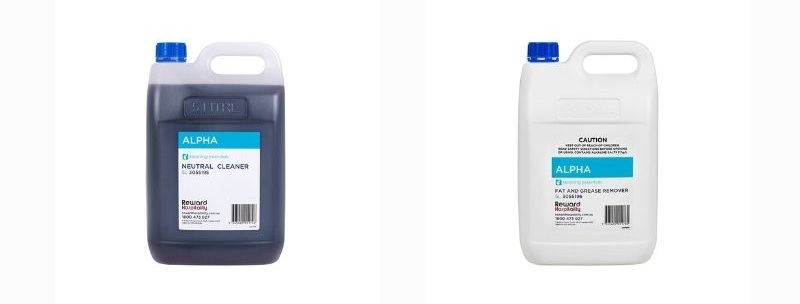
Degreasers, sanitisers, and neutral cleaners all play an important role in maintaining food-safe environments. Degreasers are essential for breaking down oils and fats on cooking equipment and floors. The Alpha Fat & Grease Remover 5L is formulated to tackle animal fat, grease, and grime on a wide range of surfaces. This colourless and perfume-free formula requires no rinsing. It leaves surfaces clean with no residue or film perfect for food prep areas, kitchens, and commercial settings. Meanwhile, neutral cleaners are ideal for daily cleaning where strong chemicals are not required. A pH-neutral cleaner like the Alpha Neutral Cleaner 5L is formulated for everyday use on resilient hard floors. This no-rinse solution is suitable for tiled, wooden, and linoleum surfaces, making it ideal for maintaining lightly soiled sealed or unsealed floors.
Dishwashing areas play a critical role in maintaining hygiene and keeping kitchen operations running smoothly. Whether washing by hand or using commercial dishwashers, each method presents different challenges. Manual warewashing relies heavily on staff technique and consistent chemical use. Using dishwashers depends on precise chemical dosing and water conditions for reliable results. Utilising the wrong products can lead to poor cleaning, rewash cycles, and increased labour time.
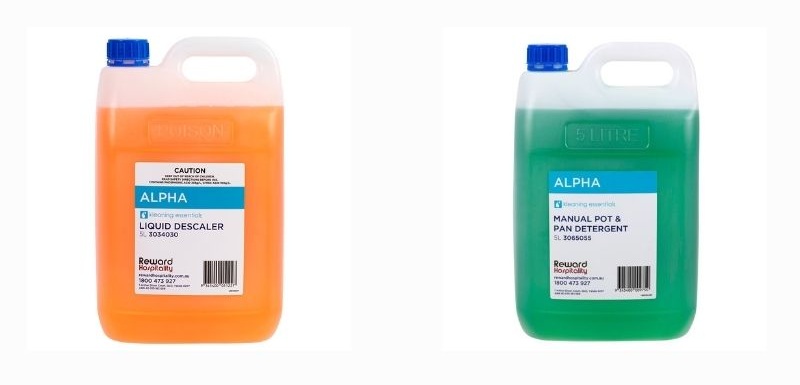
Detergents, rinse aids, and descalers each serve a specific purpose in commercial kitchens. Dishwashing detergents remove food residue, fats, and proteins from plates, cookware, and utensils. The Alpha Pot and Pan Detergent removes food soils and grease from kitchenware while being gentle on hands. Its non-hazardous formula is safe for all washable surfaces, making it a reliable choice for busy kitchens. Descalers like the Alpha Heavy Duty Descaler are essential for managing lime scale and mineral build-up. This concentrated formula provides fast and effective removal of stubborn scale, making it ideal for use on dishwashers, steam tables, and other equipment.
Bar areas are where frequent surface contact and high customer visibility are expected. Spills, fingerprints, and residue can be built quickly. Since bars and pubs operate continuously during service, cleaning products must work quickly without disrupting staff or guests.
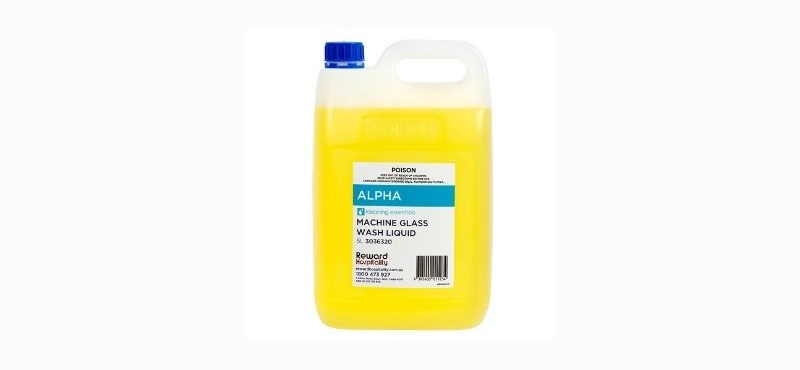
Beverage equipment and glassware require special attention to maintain hygiene and presentation. The Alpha Machine Glasswasher 5L is specially formulated to deliver sparkling, streak-free glassware with every wash. Its powerful yet gentle formula ensures effective cleaning without posing risk to the next person to drink from the glass.
Dining areas are one of the most visible parts of any hospitality venue. That's why cleanliness plays a direct role in how customers perceive the business. Clean tables, floors, and windows help build trust and reassure guests that food safety and hygiene are taken seriously. Even small issues, such as sticky tables or smudged glass, can negatively impact the overall dining experience.
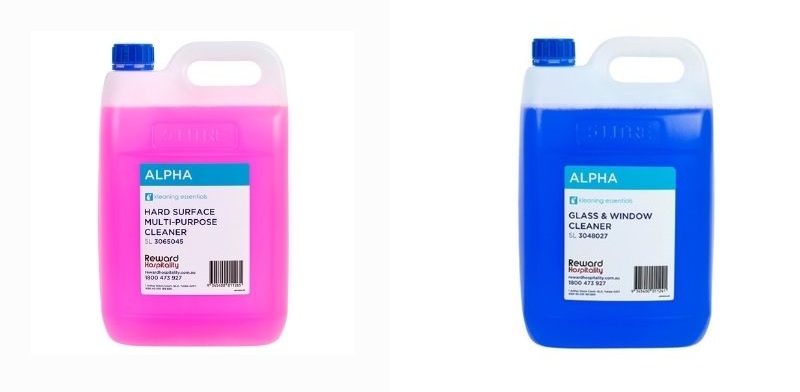
It is important to use safe, non-toxic cleaners that are suitable for public spaces. For glass and windows, the product should be effective while being gentle enough for regular use. The Alpha Glass & Window Cleaner cuts through grease and soil, leaving windows gleaming without the need for harsh chemicals. Alpha Multi-Purpose Cleaner is great for wiping down tables and floor areas as its food safe but effectively eliminates food and grease.
Toilets and washrooms are high-use areas that require consistent and effective cleaning. These spaces are exposed to bacteria, scale build-up, and odours, especially in busy hospitality venues. Without the right cleaning products, washrooms can quickly become unhygienic and unpleasant for guests and staff.
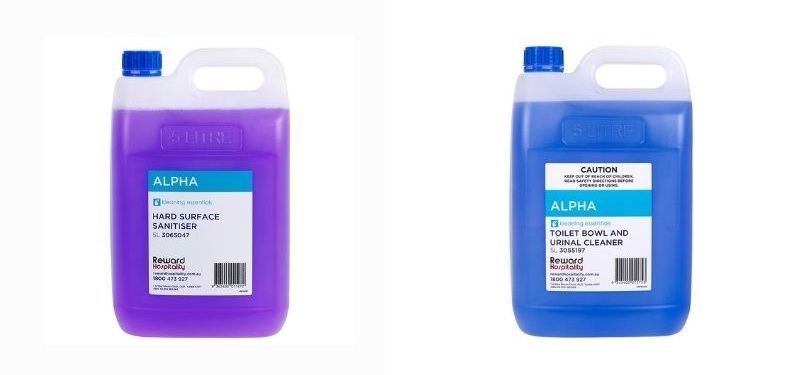
Specialised toilet, urinal, and hard-surface cleaners are essential for managing these challenges. The Alpha Hard Surface Sanitiser is designed to leave surfaces sterile and streak-free. The sanitiser is highly effective against various pathogens, including Salmonella, E.coli, Listeria, and others, ensuring a thorough sanitation process. While the Alpha Toilet Bowl & Urinal Cleaner delivers powerful cleaning and disinfecting in one convenient step. It is designed to kill most disease-causing bacteria commonly found in toilet bowls and urinals. This thickened formula clings to surfaces for enhanced contact and effective sanitation.
Understanding Different Types of Cleaning Chemicals
Choosing the right type of cleaning chemical is just as important as selecting the right product for each surface. Different chemical formats are designed for different operational needs and safety requirements. Understanding these options helps hospitality businesses improve efficiency, reduce risk, and control costs.
Ready-to-Use (RTU) Chemicals
Ready-to-use chemicals require no dilution and can be used straight from the bottle. This makes them easy to use and reduces the risk of mixing errors. They are ideal for quick cleaning tasks and high-traffic areas where speed and safety are essential.
Non-Dangerous Goods
Non-dangerous goods offer professional cleaning performance without the storage and regulatory requirements associated with hazardous chemicals. These products are safer to handle and store, making them suitable for venues that want to minimise chemical risk.
Concentrates
Concentrated chemicals are a cost-effective choice for high-volume operations. When diluted correctly, they deliver strong cleaning performance while reducing overall waste. Concentrates are best suited to trained staff and structured dilution systems, where accurate dosing can be maintained to ensure consistent results.
Conclusion
Choosing the right cleaning chemicals for each surface is essential. Understanding how different chemical types allow businesses to match solutions to their operational needs. This ensures the right balance between safety, cost efficiency, and ease of use, particularly in fast-paced or high-turnover environments.
Equip your venue with the right cleaning solutions today! Explore our range of cleaning chemicals to maintain hygiene, compliance, and operational efficiency.